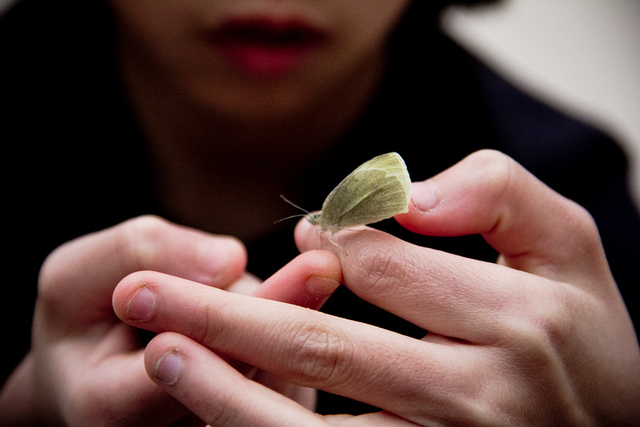
“Your pain is the breaking of the shell that encloses your understanding.” ~ Kahlil Gibran, The Prophet.
Dealing with pain is not something that we look forward to. One can’t simply rejoice in their depression or anxiety or any other mental illness—that would be quite contradictory.
These states of mind are unpleasant, and we try to avoid them at all costs. However, pain in life is often inevitable because it comes bundled with the human experience.
But just as pain is unavoidable, so is our own transformation. We don’t have much choice in these matters. We are being pulled toward what Carl Jung called individuation, to become integrated over time into a well-functioning whole, mature person.
People who have gone through an anxiety disorder or a panic disorder or depression and come out on the other side will tell you that their lives have been positively shaped by their illness.
Even though their experience was troubling and pained them a lot, in retrospect they can only see their suffering as a consequence of trying to fit into a pair of pants that they’ve long outgrown (metaphorically speaking).
The pain that we experience is a result of us having outgrown our model of reality.
We may experience it as depression, anxiety or whatever we choose to classify it as. The way we made sense of the world is no longer valid anymore. Something has changed.
Pain can be seen as quite transformative. However, rather than seeing it a causal relation, it would be more apt to visualize transformation as occurring side-by-side with painful experiences.
When caterpillar undergoes metamorphosis, it breaks down most of its original tissue to create new body parts. With only instincts as its guide, the caterpillar builds a protective cocoon around itself, and patiently gives in to the thunderous and rippling forces that tear it apart.
I’ve often wondered what it must be like, from the caterpillar’s perspective, to undergo such a profound change. I wonder if it feels any pain when its body parts are broken down by enzymes while it just hangs inside the cocoon, not knowing what is happening to it.
I sometimes question whether the pain that I experience in my anxiety, bouts of sadness and uncertainty about my future is the same kind of pain that a caterpillar might experience during its metamorphosis.
Of course, it may very well remain anesthetized during the entire process. We have no way of knowing the physical and mental anguish that the young butterfly is going through as it molds. I’m just using my creative imagination here to compare a biological metamorphosis with a psychological one.
Comparably, like our caterpillar cousin, when we are born we are mostly concerned with consumption (of food, knowledge and other resources). I imagine, just like the pupa, perhaps we are preparing ourselves for the tough terrain ahead.
Usually, adulthood is the time we start to feel the weight of real life; whether we like it or not we are forced to reckon with bills, jobs, heartbreaks, relationships, success, failures, family (or lack thereof) and other such callings.
We are called to transform at many levels, and this transformation almost seems preceded by pain.
Pain can often signal that a change is necessary or inevitable.
We may experience it as anxiety when we are stuck in job or career where our heart is not. We may experience it as depression when our values are not in alignment with the life we are leading. We may experience it as dread when we learn that we have a terminal illness and haven’t come to terms with our own mortality.
Seen retrospectively, it can almost be concluded that every time we move into a painful phase in our life, life is preparing the stage for a transformation to happen. Maybe, just maybe, if we understand this, then we can choose not to suffer unnecessarily, while still experiencing the unavoidable pain.
In my own experience, I went from being a happy kid to having to deal with my dad’s cancer and death, feeling unfulfilled in my career and the eventual existential crisis involving much depression, anxiety, depersonalization and various painful experiences.
I did not choose these, just like the caterpillar did not choose to undergo its metamorphosis. Life happened, and I was dragged on along with it, whether I liked it or not.
Not every experience was painful, there were some really pleasurable ones along the ride, but the majority of my 20s was spent on failed ideas, hopelessness, boredom, scary thoughts, painful feelings, making the same mistakes over and over, eventually learning and coming to terms with my own limitations, finally realizing a truth only to be tackled by a new set of issues all over again.
But I wonder if I can see my pain as the collateral I paid for my own transformation. Are the painful feelings that I felt just the side effects of my inevitable metamorphosis? Even though I didn’t grow colorful wings and start flying around, I do see drastic changes in both my physical and psychological self over the last 10 years.
And what can be said about physical pain that is true for psychological torment as well? For example, an athlete works day in and day out in the field to get where she wants, and a body builder goes for the last pump, even though his arms start shaking and he is squirming in pain. The difference here is that the athlete or the body builder accepts this pain as collateral for the gains they wish to make. Viewed within this context, this pain can become tolerable. They are open to experiencing great difficulties during their training, and to even be sore for the next few days.
Can we view the psychological pain that we experience in the same context? That it is inevitable and is part of the transformational gain we aim to make.
Though pain can precede a change in our self, it is not the source of it. It is not through pain that we transform, but simply because it is our intrinsic telos[1] to move toward physical and mental maturation. But just as this metamorphosis is inevitable, so is the pain.
So instead of championing this pain, like some athletes do with their “No Pain, No Gain” mentality, can I embrace it as an unavoidable aspect of growth? Or, instead of finding ways to escape all my personal pains, through various distractions, can I instead accept it as a sign of development and walk along side by side?
Footnotes:
[1] In teleology, telos is the concept of an end purpose. For example, the telos of an acorn is to grow fully into an oak tree. Similarly, the telos of a human being can be postulated as achieving self-actualization.
Author: Swamy Gopalsamy
Editor: Emily Bartran
Photo: Steven Depolo/Flickr








Read 2 comments and reply